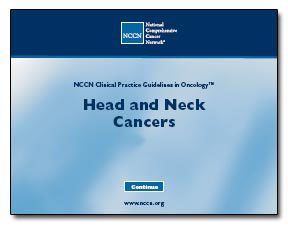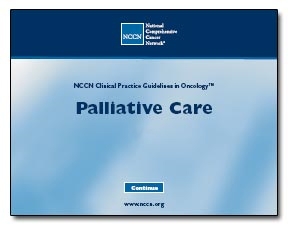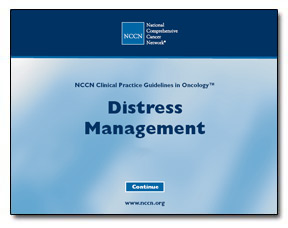OCF has obtain permission from this extraordinary organization to allow those visiting our site to access their guidelines. You may do so from a direct link to their web site, (provided below) which has a wealth of information for doctors and patients, or in our areas of concern at OCF and read their unaltered guidelines on the OCF site.
About NCCN
 The National Comprehensive Cancer Network (NCCN), a not-for-profit alliance of 21 of the world’s leading cancer centers, is dedicated to improving the quality and effectiveness of care provided to patients with cancer. Through the leadership and expertise of clinical professionals at NCCN Member Institutions, NCCN develops resources that present valuable information to the numerous stakeholders in the health care delivery system. As the arbiter of high-quality cancer care, NCCN promotes the importance of continuous quality improvement and recognizes the significance of creating clinical practice guidelines appropriate for use by patients, clinicians, and other health care decision-makers. The primary goal of all NCCN initiatives is to improve the quality, effectiveness, and efficiency of oncology practice so patients can live better lives. World-renowned experts from NCCN Member Institutions diagnose and treat patients with a broad spectrum of cancers and are recognized for dealing with complex, aggressive, or rare cancers. More than 160,000 new patients receive cancer care at NCCN Member Institutions over the course of any year. NCCN Member Institutions pioneered the concept of the multidisciplinary team approach to patient care and lead the fight against cancer as they integrate programs in patient care, research, and education. Our programs offer access to expert physicians, superior treatment, and quality and safety initiatives that continuously improve the effectiveness and efficiency of cancer care. Thirty-eight Nobel Prize winners have served on the faculties of NCCN Member Institutions.
The National Comprehensive Cancer Network (NCCN), a not-for-profit alliance of 21 of the world’s leading cancer centers, is dedicated to improving the quality and effectiveness of care provided to patients with cancer. Through the leadership and expertise of clinical professionals at NCCN Member Institutions, NCCN develops resources that present valuable information to the numerous stakeholders in the health care delivery system. As the arbiter of high-quality cancer care, NCCN promotes the importance of continuous quality improvement and recognizes the significance of creating clinical practice guidelines appropriate for use by patients, clinicians, and other health care decision-makers. The primary goal of all NCCN initiatives is to improve the quality, effectiveness, and efficiency of oncology practice so patients can live better lives. World-renowned experts from NCCN Member Institutions diagnose and treat patients with a broad spectrum of cancers and are recognized for dealing with complex, aggressive, or rare cancers. More than 160,000 new patients receive cancer care at NCCN Member Institutions over the course of any year. NCCN Member Institutions pioneered the concept of the multidisciplinary team approach to patient care and lead the fight against cancer as they integrate programs in patient care, research, and education. Our programs offer access to expert physicians, superior treatment, and quality and safety initiatives that continuously improve the effectiveness and efficiency of cancer care. Thirty-eight Nobel Prize winners have served on the faculties of NCCN Member Institutions.
Guidelines For Treatment (Professionals)

These guidelines are a statement of consensus of the authors regarding their views of currently accepted approaches to treatment. Any clinician seeking to apply or consult these guidelines is expected to use independent medical judgment in the context of individual clinical circumstances to determine any patient’s care or treatment.
Read now (Acrobat PDF) Size 685 KB
Adult Cancer Pain Guidelines

These guidelines are a statement of consensus of the authors regarding their views of currently accepted approaches to treatment. Any clinician seeking to apply or consult these guidelines is expected to use independent medical judgment in the context of individual clinical circumstances to determine any patient’s care or treatment.
Read now (Acrobat PDF) Size 229KB
Palliative Care

These guidelines are a statement of consensus of the authors regarding their views of currently accepted approaches to treatment. Any clinician seeking to apply or consult these guidelines is expected to use independent medical judgment in the context of individual clinical circumstances to determine any patient’s care or treatment.
Read now (Acrobat PDF) Size 234KB
Cancer-Related Fatigue

These guidelines are a statement of consensus of the authors regarding their views of currently accepted approaches to treatment. Any clinician seeking to apply or consult these guidelines is expected to use independent medical judgment in the context of individual clinical circumstances to determine any patient’s care or treatment.
Read now (Acrobat PDF) Size 234KB
Prevention and Treatment of Cancer-Related Infections

These guidelines are a statement of consensus of the authors regarding their views of currently accepted approaches to treatment. Any clinician seeking to apply or consult these guidelines is expected to use independent medical judgment in the context of individual clinical circumstances to determine any patient’s care or treatment.
Read now (Acrobat PDF) Size 234KB
Distress Management

These guidelines are a statement of consensus of the authors regarding their views of currently accepted approaches to treatment. Any clinician seeking to apply or consult these guidelines is expected to use independent medical judgment in the context of individual clinical circumstances to determine any patient’s care or treatment.
Read now (Acrobat PDF) Size 265KB




